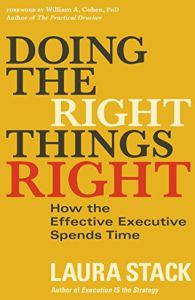
Doing the Right Things Right
How the Effective Executive Spends Time
Recommendation
In 1967, Peter Drucker, the father of modern management, published The Effective Executive: The Definitive Guide to Getting the Right Things Done. Drucker’s best-selling work, which codified business productivity, remains a revered, popular classic. Some of Drucker’s concepts, however, are more traditional than modern. Productivity consultant Laura Stack takes up where Drucker left off, offering a fresh perspective in her updated supplement to Drucker’s indispensable manual. She presents three “T’s” of leadership – “strategic thinking, team focus and tactical work” – as the organizing rubric for 12 critical management goals. Stack details why and how modern executives must operate in “efficient and effective” ways. getAbstract recommends her update to all executives – a category, she says, that includes anyone who makes important decisions.
Summary
About the Author
Laura Stack founded The Productivity Pro consultancy. Her other books include What To Do When There’s Too Much To Do and Execution Is the Strategy.



















Comment on this summary